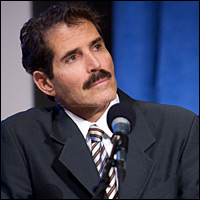
The advocates of government controlled health care keep pushing the prevention-saves-money myth.
The Pacific Research Institute’s Sally Pipes offers more reasons why prevention, even when it’s a good thing, doesn’t make health care cheaper:
… another example from a study published last year in the journal Circulation. Suppose we enact several highly recommended measures to control cardiovascular disease and diabetes…
Suppose that these prevention measures were 100 percent successful. The estimated cost of treating at-risk patients over the next 30 years would drop by about a trillion dollars. The preventive measures themselves, though, would cost $8.5 trillion — offsetting the savings by a factor of almost 10…
Fifteen years ago, the federal government began requiring food manufacturers to post nutrition and calorie information on food labels. Since then, Americans have had access to a barrage of data on every Snickers bar and bag of Cheez Doodles.
But the labeling hasn’t made us healthier. In fact, we’re actually fatter… With smoking cessation programs, the story is similar.
And even when prevention measures do make us healthier, that doesn’t necessarily save money.
Extending longevity tends to increase overall health spending. Illnesses like Alzheimer’s, osteoarthritis, osteoporosis and prostate cancer make the final years of life incredibly expensive. The average nonsmoker who lives to age 84 will require about $100,000 more in medical expenses than the average smoker who dies seven years sooner because of his bad habit.
A few preventive measures do indeed save money. Others may impose a net cost but nonetheless are worth it because they improve our well-being. Preventive and wellness efforts may reduce pain and suffering and increase quality of life — which may be justification enough.
But that’s not the justification Washington is offering. Instead, lawmakers are trying to sell us on the seductive — but ultimately false — idea that taxpayer dollars spent on prevention can yield long-term savings.
We face a staggering federal deficit and increased taxes for all Americans if Obama’s health care reform ideas are enacted. We need honest information about what proposed reforms will cost. And so it’s time for politicians to swear off “Dr. Feel-Good’s Incredible Health-Promoting, Cost-Saving Elixir.”
The Great “Prevention” Myth II
John Stossel
The advocates of government controlled health care keep pushing the prevention-saves-money myth.
The Pacific Research Institute’s Sally Pipes offers more reasons why prevention, even when it’s a good thing, doesn’t make health care cheaper:
… another example from a study published last year in the journal Circulation. Suppose we enact several highly recommended measures to control cardiovascular disease and diabetes…
Suppose that these prevention measures were 100 percent successful. The estimated cost of treating at-risk patients over the next 30 years would drop by about a trillion dollars. The preventive measures themselves, though, would cost $8.5 trillion — offsetting the savings by a factor of almost 10…
Fifteen years ago, the federal government began requiring food manufacturers to post nutrition and calorie information on food labels. Since then, Americans have had access to a barrage of data on every Snickers bar and bag of Cheez Doodles.
But the labeling hasn’t made us healthier. In fact, we’re actually fatter… With smoking cessation programs, the story is similar.
And even when prevention measures do make us healthier, that doesn’t necessarily save money.
Extending longevity tends to increase overall health spending. Illnesses like Alzheimer’s, osteoarthritis, osteoporosis and prostate cancer make the final years of life incredibly expensive. The average nonsmoker who lives to age 84 will require about $100,000 more in medical expenses than the average smoker who dies seven years sooner because of his bad habit.
A few preventive measures do indeed save money. Others may impose a net cost but nonetheless are worth it because they improve our well-being. Preventive and wellness efforts may reduce pain and suffering and increase quality of life — which may be justification enough.
But that’s not the justification Washington is offering. Instead, lawmakers are trying to sell us on the seductive — but ultimately false — idea that taxpayer dollars spent on prevention can yield long-term savings.
We face a staggering federal deficit and increased taxes for all Americans if Obama’s health care reform ideas are enacted. We need honest information about what proposed reforms will cost. And so it’s time for politicians to swear off “Dr. Feel-Good’s Incredible Health-Promoting, Cost-Saving Elixir.”
Nothing contained in this blog is to be construed as necessarily reflecting the views of the Pacific Research Institute or as an attempt to thwart or aid the passage of any legislation.